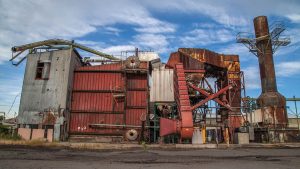
Isthus Engineering, Madison WI, a robotics and advanced tool manufacturing coop with 50+ workers
By Max Ogden, Nina Gregg et al
The Next System via Portside
Oct 17, 2016 – This essay is a polemic. As such, we argue with broad strokes. We welcome debate on the broad strokes as well as the details, knowing that such an exchange will refine and improve the discussion.1
We are thinkers and practitioners from the United States and Australia. Our views principally reflect where we come from, but we are confident that our themes are an important part of a global discussion.
We are arguing here for the singular importance of advanced manufacturing. Our emphasis on advanced manufacturing is not because we love advanced manufacturing, but because we think it is necessary to achieve a next system that is democratic, equitable, sustainable, and restorative. If we thought free beer would be as important or as necessary, we would be advocating for free beer instead of for advanced manufacturing.
Advanced manufacturing is very different from the popular image of industrial production.
Advanced manufacturing is very different from the popular image of industrial production. Most modern plants are clean, generate few emissions, and are critical to industries as varied as food processing, sustainable technology in solar and wind energy, and transportation.
Advanced manufacturing requires high skills and continuing education and pays better wages than low-skill work.
Our argument for a key role for advanced manufacturing in the next system is grounded in opposition to three currents of thought:
- We oppose the current of thought that does not see the need for systemic change in order to build a productive, inclusive, and sustainable society;
- We oppose the current of thought that sees the “market,” “market forces,” and corporate structures as inherently corrupting
- And we oppose the current of thought that sees the state as the only vehicle for progressive change.
We believe, on the contrary, that the movement for the next system must institutionalize its values and achieve its objectives within the market, the state, and civil society.
First among those values and objectives, support for social inclusion must be the basis of decisions about building the next system. The world’s poor and marginalized people must be able to achieve their self-interested objectives. To that end, we must make available to everyone the ability to take advantage of local and global opportunities, to participate in community and society, and to contribute to social and cultural life. We recognize that the capitalist economy and its primary institutions have been and continue to be based on the exploitation of workers from whom have been stripped ownership and control of their work activity and their product. Moreover, our current global economy has been constructed around race, gender, and empire in ways that have systematically disadvantaged people of color, women, and nations outside the core. Signs of this living legacy are everywhere, and they must be addressed with conscious intention if we hope to reach a next system that is constructed differently—one that is democratic, equitable, sustainable, and restorative.
Our current global economy has been constructed around race, gender, and empire in ways that have systematically disadvantaged people of color, women, and nations outside the core. (continued)
Continue reading Jobs and the Future: Advancing the Next System with Advanced Manufacturing


